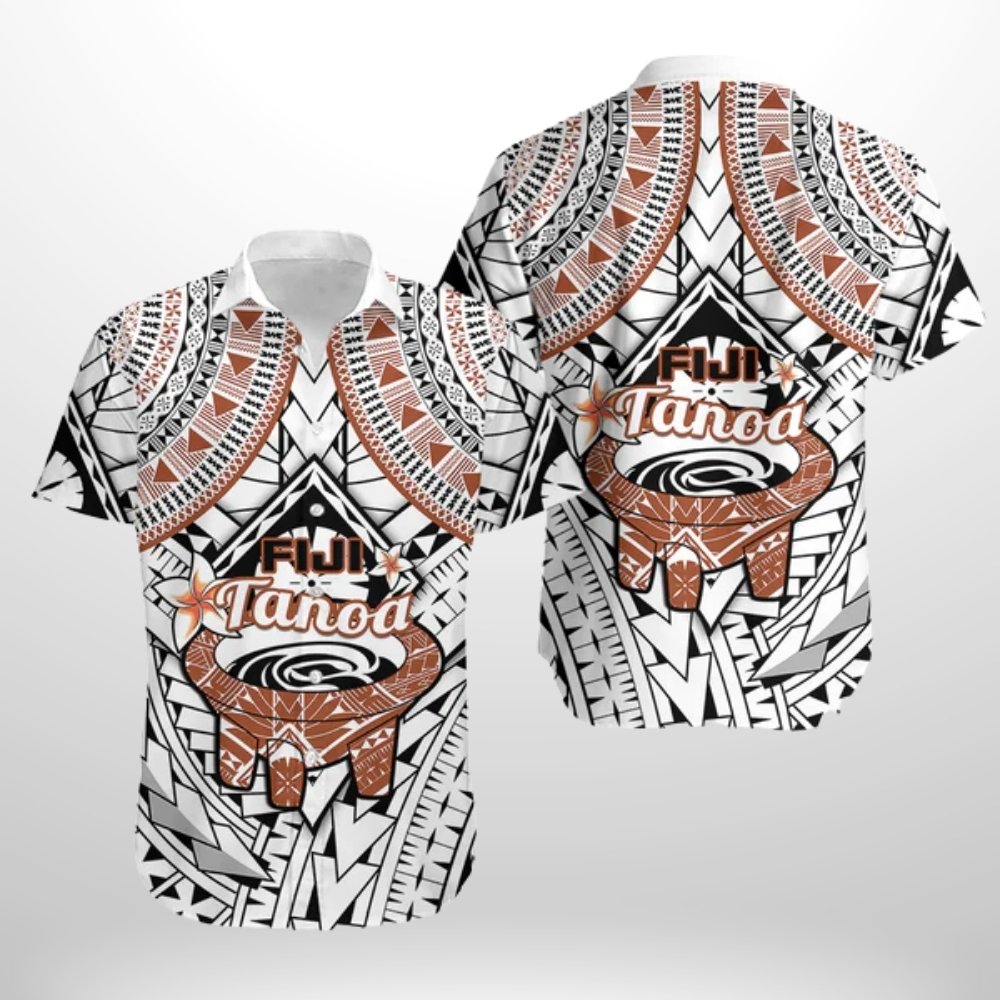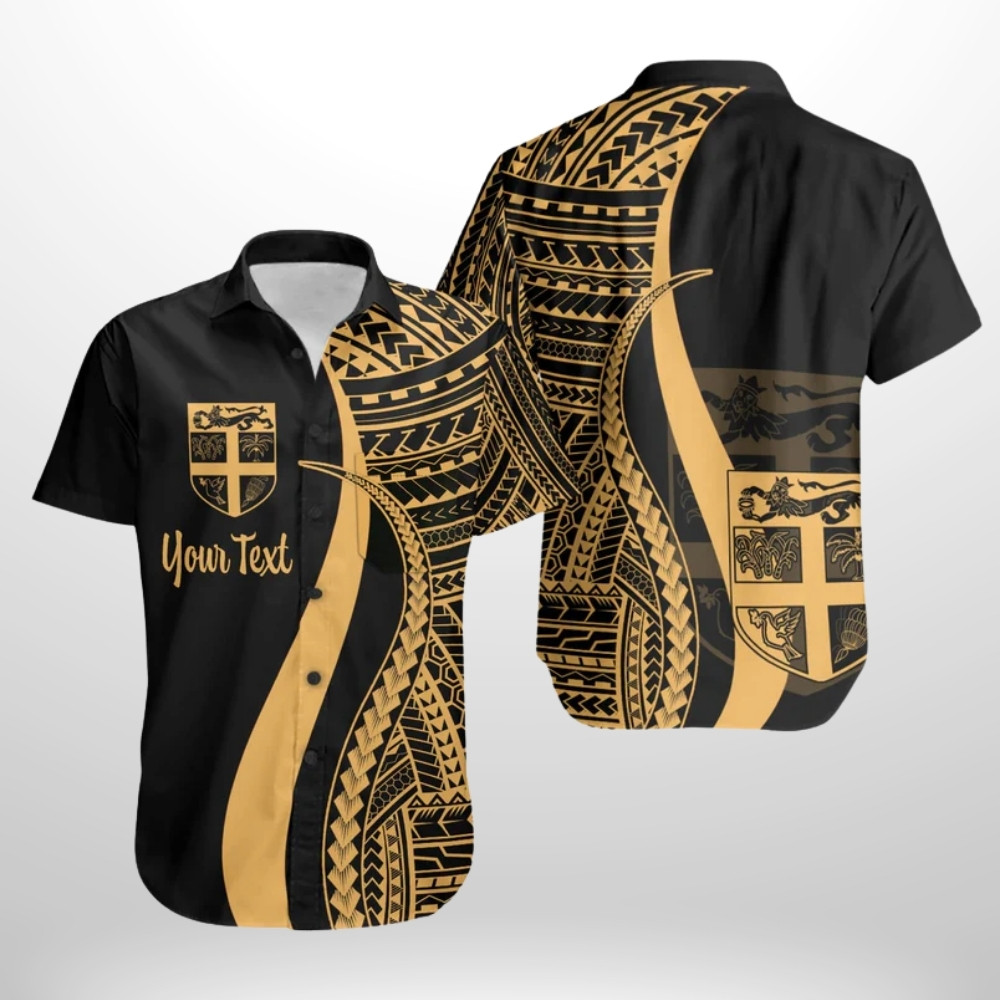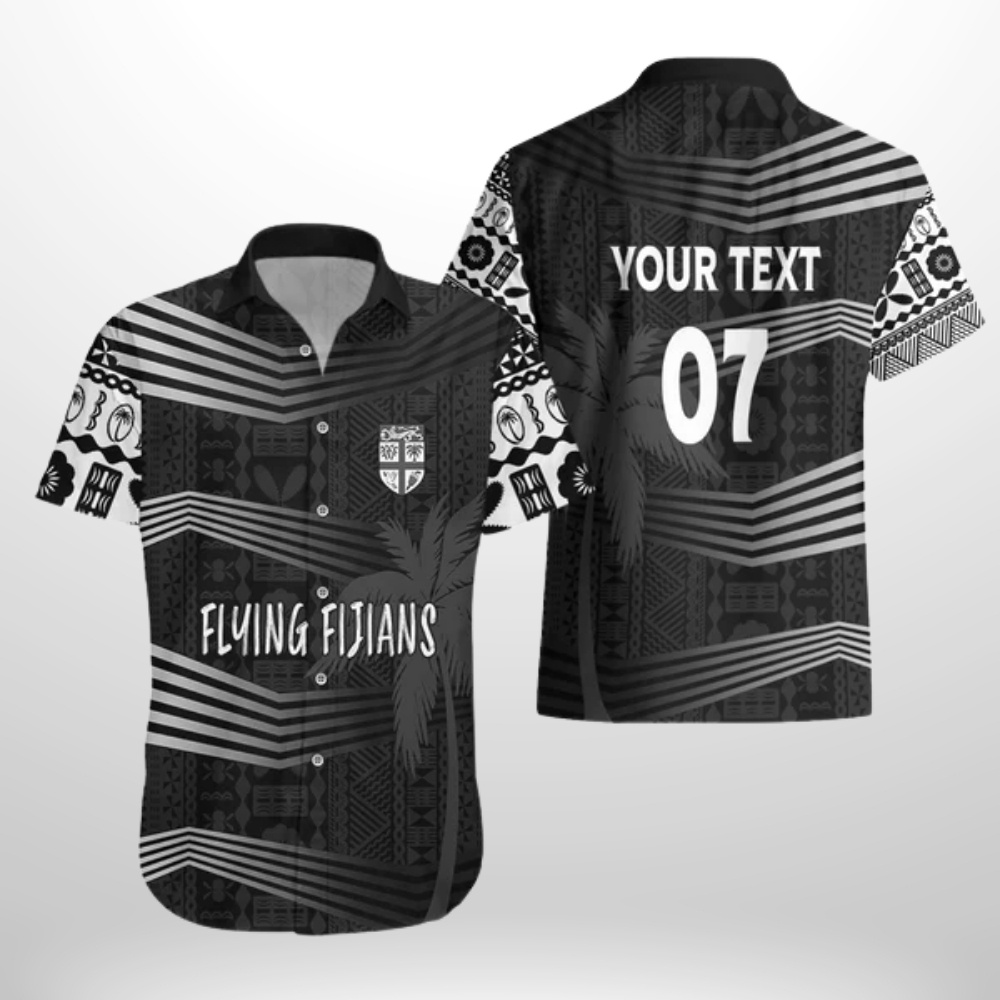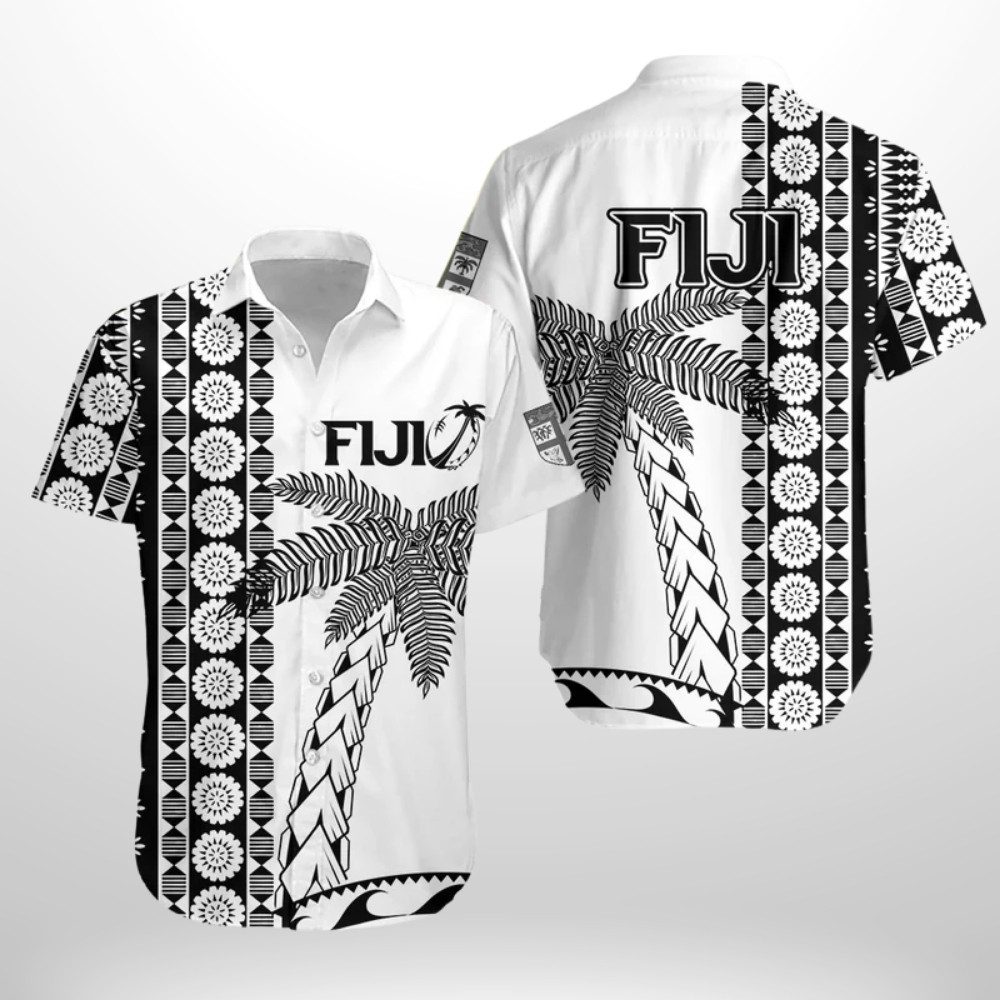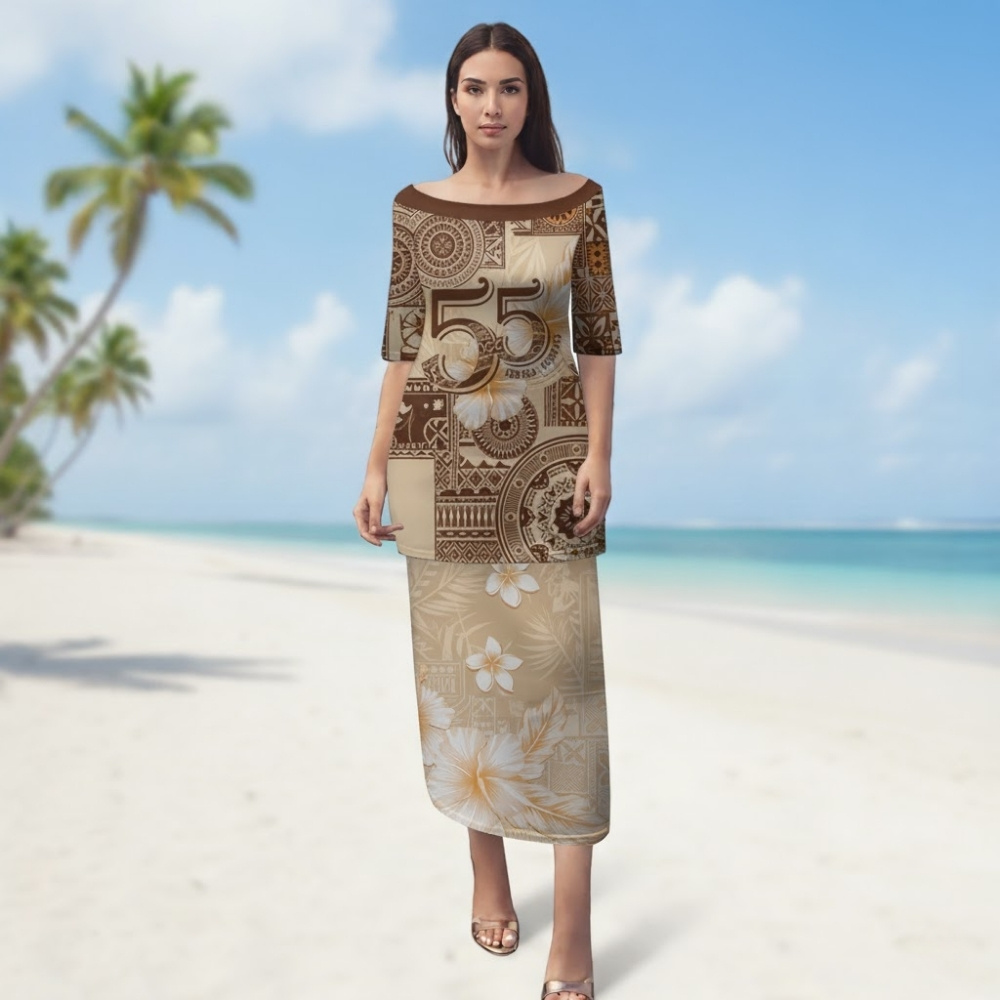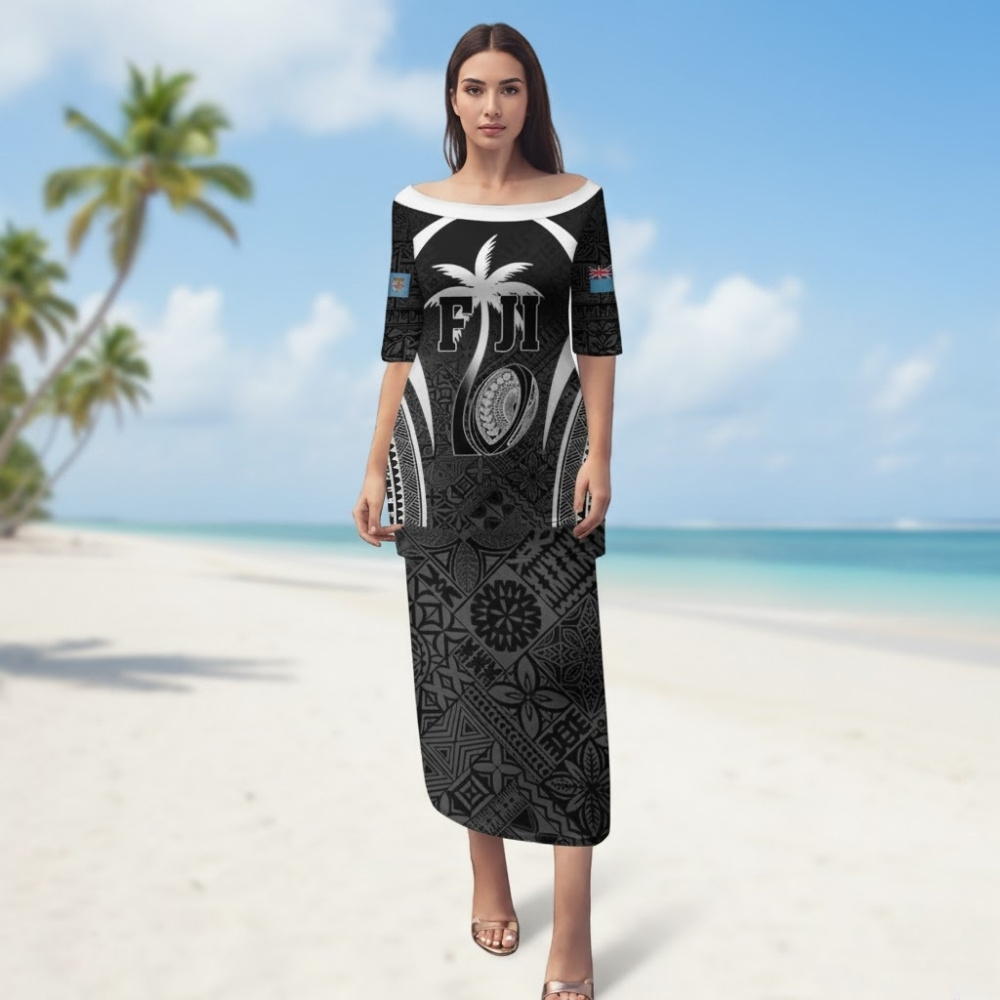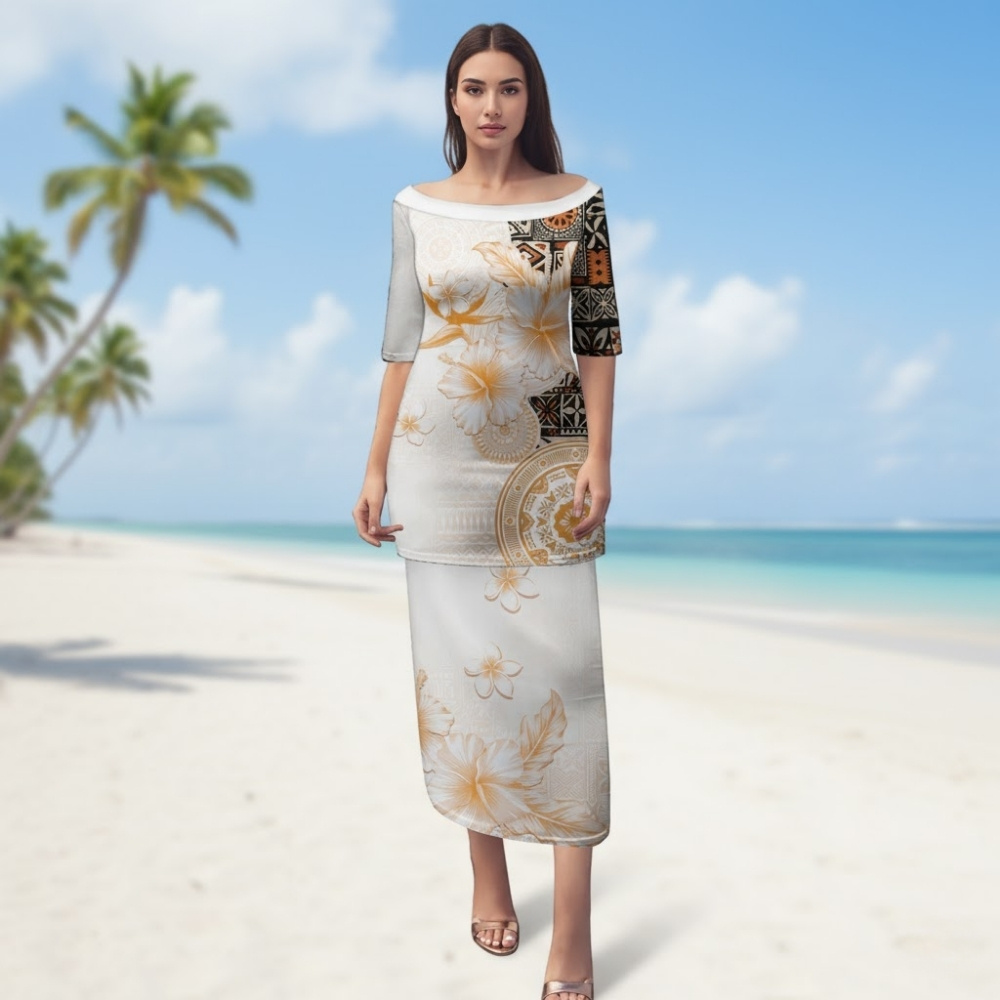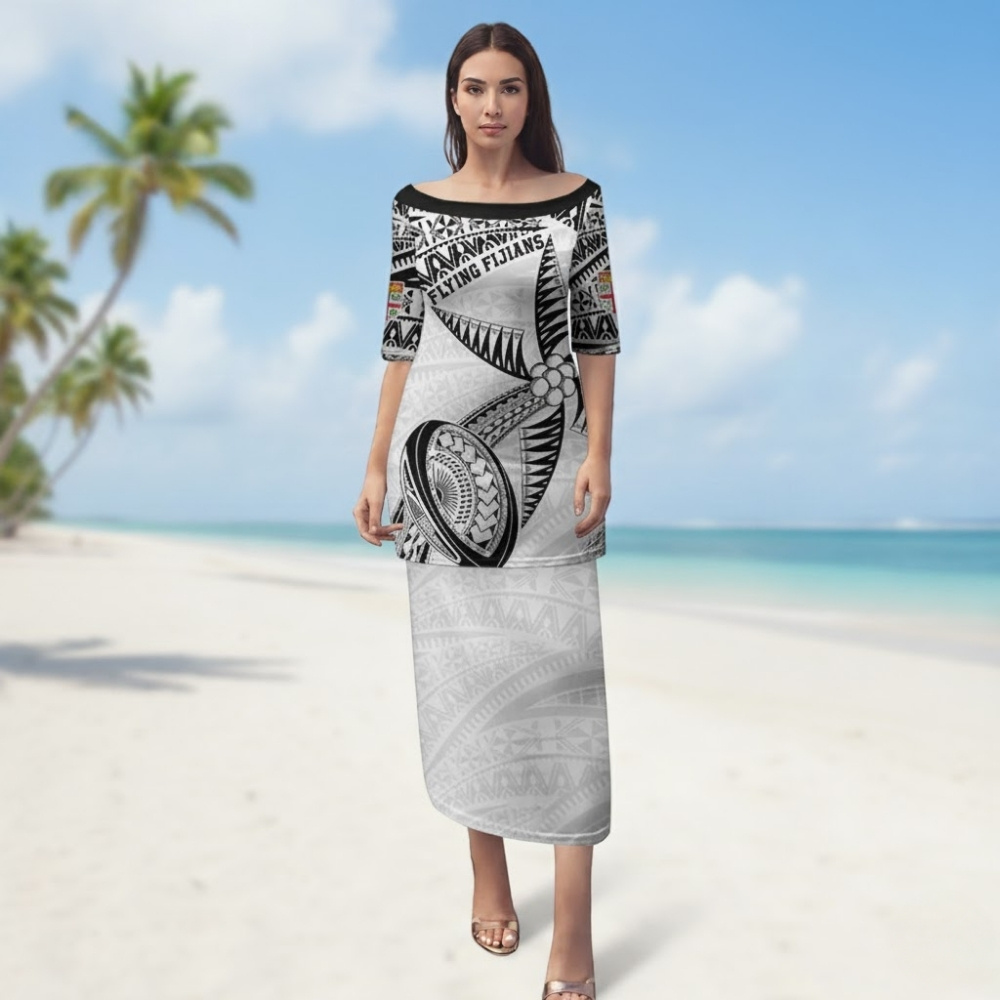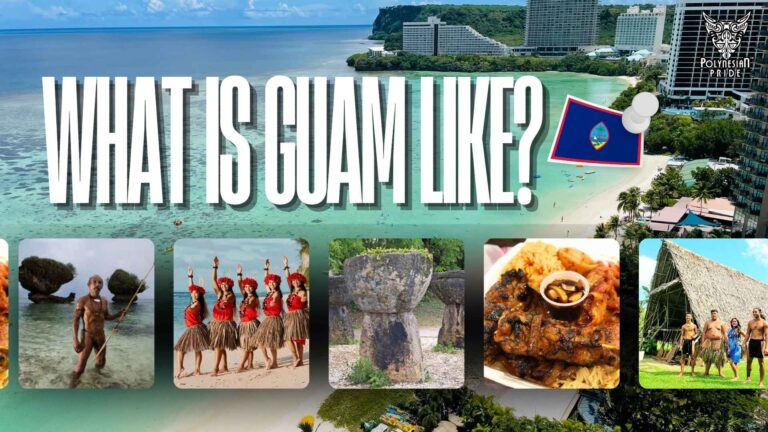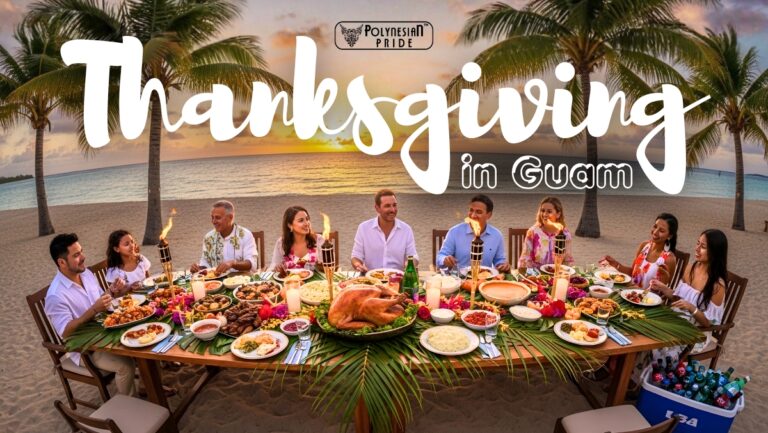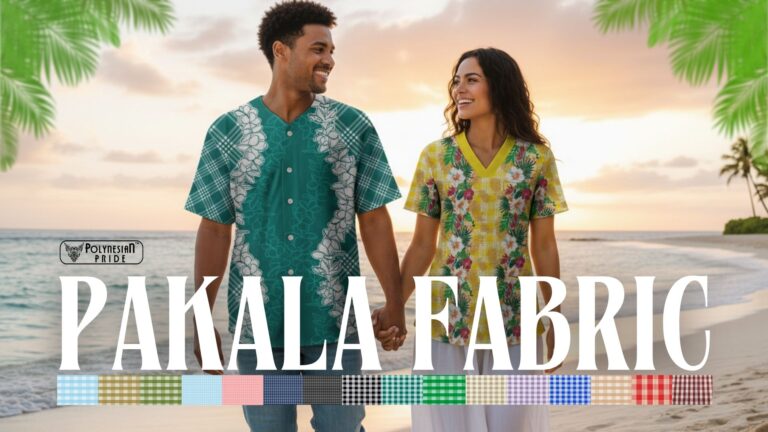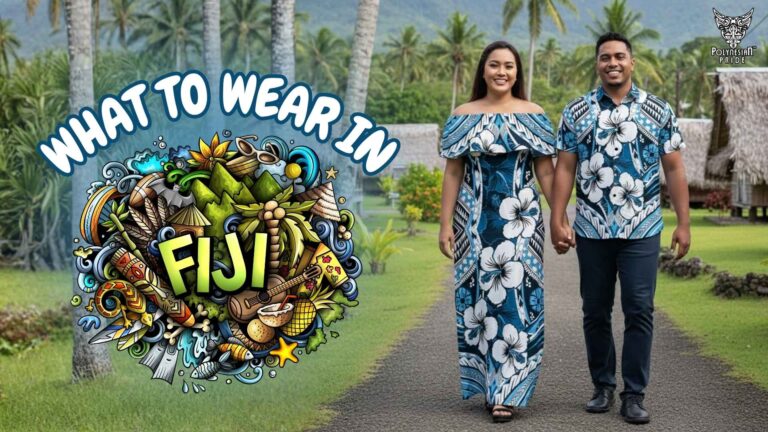Fijian Traditional Wedding – Where Culture and Love Unite
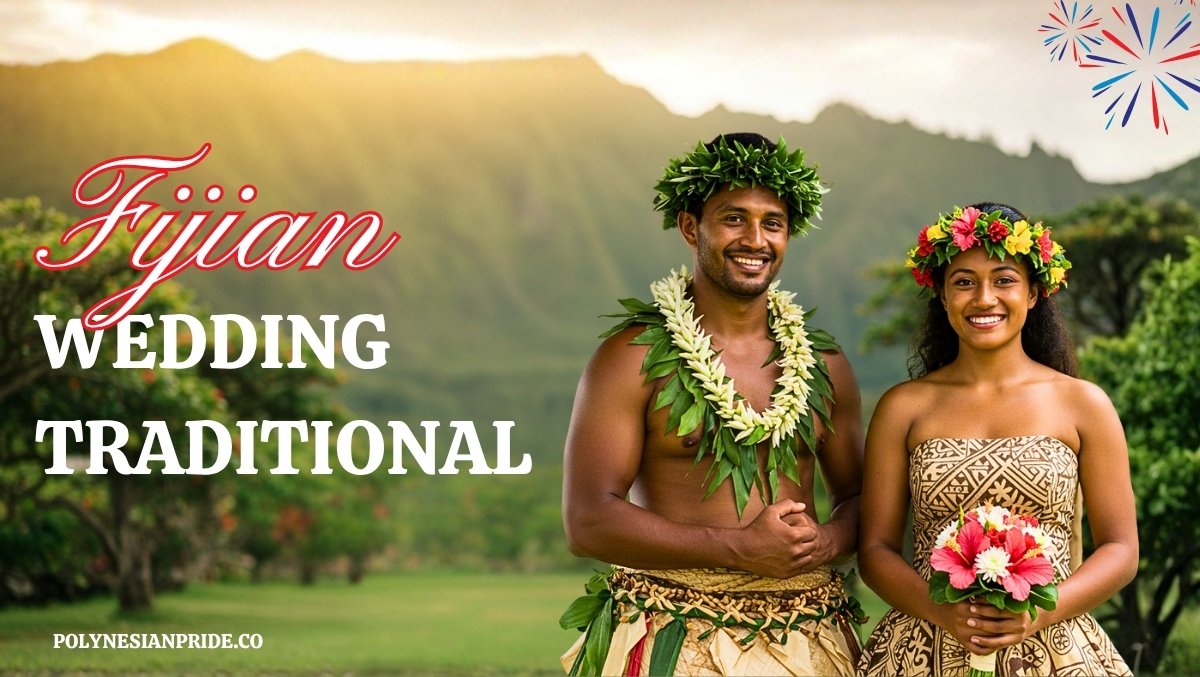
Where Culture, Faith, and Love Become One
Have you ever wondered what a wedding looks like when ancient island traditions meet heartfelt Christian faith?
A Fijian traditional wedding is precisely that — a breathtaking celebration where centuries-old customs intertwine with modern romance and spiritual devotion. Each ceremony, from the sacred Yaqona (Kava) Ceremony to the beautifully handcrafted Masi (Tapa Cloth), reveals the deep soul of Fijian Culture.
In Fiji, a wedding isn’t just about the Bride and Groom – it’s a joyous union of families, friends, and the entire Fijian Village, coming together in music, dance, and prayer. It’s a Fijian wedding ceremony custom that continues to inspire awe, reminding everyone that love, faith, and community are forever connected in these Pacific island wedding traditions.
Sacred Rituals of a Fijian Traditional Wedding
A Fijian Traditional Wedding is far more than a union between two individuals — it is a sacred passage that intertwines ancestral blessings, tribal unity, and spiritual devotion. Each tradition reflects Fijian cultural marriage practices, blending ancient customs with heartfelt devotion to faith and kinship.
Yaqona (Kava) Ceremony – The Ritual of Unity
The Yaqona (Kava) ceremony in weddings marks the beginning of the wedding, bringing together both families and village elders. The ritual begins when elders prepare a bowl of yaqona (a sacred drink made from the powdered root of the pepper plant) in a carved wooden tanoa bowl, mixing it with water and stirring it with care.
This moment marks the spiritual merging of two families under ancestral guidance:
- Cultural Role: The ceremony is led by the Chief (Turaga-ni-koro) or an appointed elder, symbolizing authority and the blessing of the community. His role ensures the ceremony is conducted with dignity and adherence to tribal protocol.
- Purpose: The Yaqona represents unity and peace. As it is passed around the circle, beginning with the Chief, then to the bride and groom, and finally to guests by rank, it reaffirms mutual respect and the strengthening of kinship ties.
- Tradition: Each sip of yaqona is accompanied by clapping — one clap before drinking and three after — symbolizing acknowledgment, gratitude, and acceptance. The first serving to the Chief is a gesture of hierarchy and cultural order.
This ceremony reflects the very essence of Fijian wedding culture symbolism — hospitality, equality, and reverence for lineage. It transforms the wedding from a private union into a community-blessed covenant of love.
Tabua (Whale’s Tooth) – The Sacred Token of Love
The Tabua ceremony is one of Fiji’s most profound and symbolic wedding rituals — a sacred exchange representing trust, sincerity, and lifelong devotion.
Traditionally polished to a smooth ivory sheen, the Tabua is presented by the groom’s family to the bride’s as part of Fijian engagement traditions, sealing the union with honor and ancestral blessing.
- Symbolism: The Tabua embodies purity, truth, and unbreakable commitment. Its circular form represents eternity — a promise that love and loyalty will never end.
- Cultural Value: Once used as a form of currency in precolonial Fiji, the Tabua has evolved into a sacred heirloom, passed down through generations. It is often stored in woven mats and displayed during major Fijian ceremonial events, such as marriages, reconciliations, and chiefly gatherings.
- Ceremonial Act: The exchange is performed in the presence of elders, accompanied by blessings, chants, and sometimes Fijian meke songs and dances that honor the sacredness of the bond. The Chief’s prayer — known as the Chief’s Blessing in a Fijian wedding — consecrates the gesture, invoking spiritual guardians to protect the union.
Through the Tabua exchange, two families symbolically merge their bloodlines and forge a tribal alliance through marriage, reaffirming that the couple’s love is not only personal but communal and ancestral.
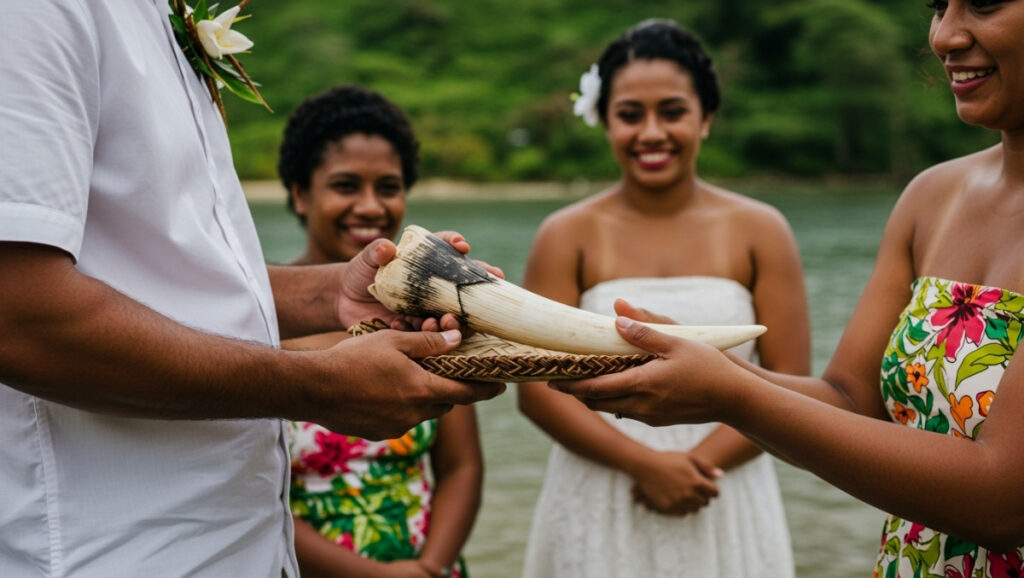
Christian Church Ceremony – When Faith Blesses the Union
After the village rituals, the couple often participates in a Christian Church ceremony. This reflects the blending of traditional Fijian marriage traditions with modern faith. Introduced by missionaries in the 19th century, Christianity reshaped but never replaced the Fijian spiritual worldview — instead, it harmonized with it.
- Structure: The ceremony typically includes prayers, scripture readings, hymns sung by Fijian Choirs, vows exchanged before the congregation, and blessings from the pastor. It often begins with a traditional procession led by the bride’s family, symbolizing her journey from one lineage to another.
- Attire: The Fijian bride and groom attire beautifully merge both worlds. Brides may wear dresses made of Masi (Tapa Cloth), hand-painted with tribal motifs, or modern gowns featuring Fijian lace and island florals. Grooms may don a sulu and a woven sash, representing humility and respect.
- Meaning: This ceremony fuses Christian sanctity with Fijian cultural depth. It recognizes divine authority over marriage while retaining tribal blessings, ensuring the couple is protected both spiritually and culturally.
Together, these sacred rituals — from Yaqona to Tabua to the Church blessing — form the full circle of the Fijian marriage tradition. They embody the enduring belief that marriage is not only a bond between two hearts but a covenant that honors ancestors, strengthens community, and reflects the divine harmony between faith and heritage.
Fijian Wedding Attire and Symbolic Elements
Every element of a Fijian marriage celebration carries deep meaning — from the garments worn to the decorations displayed. These cultural details reflect the island’s devotion to heritage, unity, and faith, turning each ceremony into a living work of art.
Masi (Tapa Cloth) – The Fabric of Traditional Fijian
One of the most iconic features of any Fijian wedding costume is the Masi (Tapa Cloth), a handcrafted barkcloth that embodies purity, heritage, and artistry. Made from the inner bark of the paper mulberry tree, this material is used to create wedding attire, decorations, and ceremonial gifts.
- Craftsmanship: Women in the village skillfully beat and dry the bark, then decorate it with tribal motifs representing the couple’s lineage.
- Symbolism: The masi signifies purity and connection to ancestors — an outward display of inner faith and cultural pride.
- Usage: Brides often wear masi dresses or wraps, while grooms use it as a sash or ceremonial garment.
Each piece of masi carries its own story, blending beauty and meaning into every stitch. It’s more than fabric — it’s the heartbeat of Fiji’s cultural soul.
Fijian Village Decorations and Symbols
The setting of a Fijian Village transforms into a living work of art during a wedding. Decorations are crafted using natural materials, showcasing the islanders’ deep respect for the land and the sea that sustain them.
Common decorative elements include:
- Woven mats (kuta or pandanus): Used to line the ceremony space, symbolizing hospitality and humility.
- Shell ornaments and coconut leaves: Represent abundance, fertility, and blessings for the newlyweds.
- Carved wooden bowls and Tabua (Whale’s Tooth): Sacred items displayed to honor ancestors and the unity of both families.
Together, these decorations create an atmosphere of reverence and celebration — turning the village into a sacred space where culture, nature, and community become one.
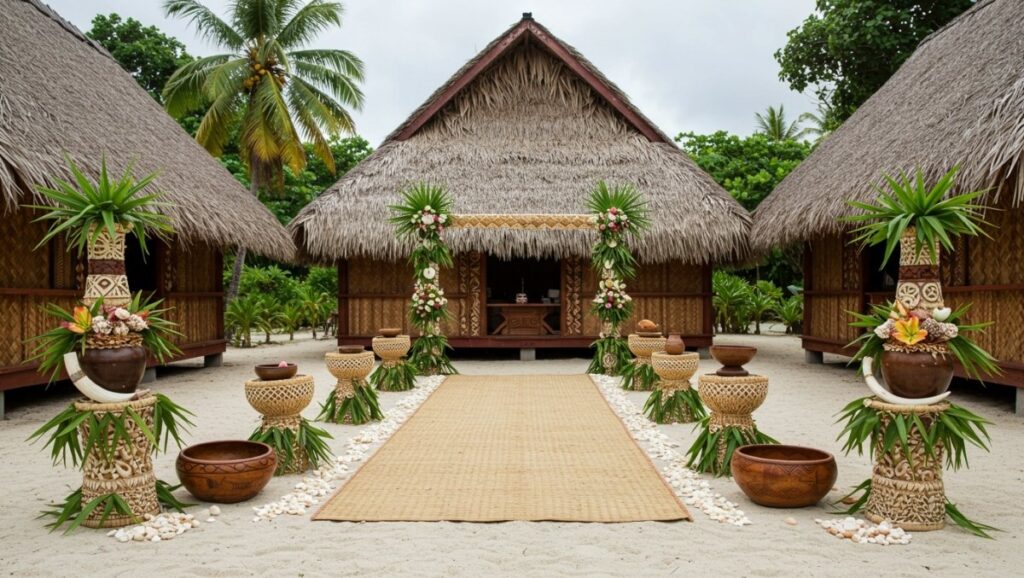
Cultural Symbols in a Fijian Traditional Wedding
Beyond attire and decorations, island wedding ceremonies are filled with objects that carry deep cultural meaning. Each item reflects the beliefs, values, and shared identity of the Fijian people.
| Cultural Element | Description | Symbolic Meaning |
| Yaqona (Kava) | A traditional drink served during the ceremony | Unity, respect, and blessing |
| Tabua (Whale’s Tooth) | Exchanged between families | Loyalty, honor, eternal bond |
| Masi (Tapa Cloth) | Barkcloth used for attire and decorations | Purity, heritage, identity |
| Lovo Feast | Traditional earth-oven meal | Celebration, hospitality, togetherness |
| Meke Dance | Cultural performance with chants and drums | Storytelling, joy, and community spirit |
Every symbol plays a vital role in preserving Fijian culture, transforming the wedding into a living testament of love, respect, and ancestral pride. Each gesture, dance, and crafted piece tells a story — one that continues to echo through generations across the islands of Fiji.
The Feast and Festivities – Lovo and Meke Dance
No Fijian marriage celebration is complete without the joy of shared food, music, and dance. After the sacred rituals, the celebration turns vibrant — a time when the entire Fijian village gathers to feast, sing, and honor the newlyweds. The atmosphere is filled with laughter, island rhythms, and the warmth of community spirit that defines Fijian hospitality.
Lovo Feast – A Meal from the Earth
The Lovo earth oven feast lies at the heart of every island’s traditional wedding, representing generosity and connection to nature. Using an ancient cooking method, food is slow-cooked in an underground oven lined with banana leaves and hot stones — a practice that symbolizes harmony between the land and the people.
The preparation itself is a shared act of love:
- Men dig the earth oven (lovo pit) and heat the stones until glowing.
- Women prepare marinated pork, fish, and root crops like taro and cassava.
- The Chief (Turaga-ni-koro) blesses the meal before it’s served to guests.
When the lovo is uncovered, fragrant steam reveals roasted pork, taro, cassava, and coconut cream dishes like palusami. Visitors often describe the lovo as the most flavorful meal they’ve ever tasted — smoky, tender, and cooked with a sense of community you can’t find anywhere else.
The feast isn’t merely about food — it’s about unity, gratitude, and the joy of sharing. In every bite, the values of Fijian village life come to life, turning a meal into a symbol of love and connection.
Meke Dance – The Language of the Islands
Once the feast ends, the air fills with drumbeats, chanting, and the graceful rhythm of the Meke Dance. This traditional performance is where art, history, and emotion intertwine.
The meke tells stories — of ancestral spirits, legendary warriors, and the love binding the Bride and Groom. Dancers move in harmony: women glide with poised elegance while men stomp with strength and pride.
- Costumes: Dancers wear Masi (Tapa Cloth) garments, shell jewelry, and sometimes body paint.
- Instruments: Wooden drums (lali) and bamboo sticks set the rhythm.
- Purpose: To celebrate unity, honor the couple, and give thanks to the ancestors.
As the night deepens, the wedding becomes a scene of shared emotion — laughter, song, and storytelling flowing together. The Meke closes the day not with formality, but with spirit — leaving every guest reminded that love in Fiji is something to be sung, danced, and lived.
What to Wear to a Fijian Village Wedding
At a Fijian village wedding, your outfit is more than a style choice — it’s a gesture of respect toward the island’s culture and community. Embrace breathable fabrics, natural tones, and tropical prints that reflect both elegance and the warm, joyful atmosphere of Fiji.
For Gentlemen of the Islands – Effortless Island Elegance
A sulu — Fiji’s traditional clothing for men — paired with a collared shirt or a Bula shirt featuring Polynesian patterns creates a look that’s both respectful and relaxed. Earthy shades, ocean blues, and sandy neutrals suit the tropical backdrop perfectly, while wooden bracelets or masi-inspired scarves add subtle cultural flair.
Tips: Opt for breathable cotton or linen Bula shirts and avoid heavy suits. Keep it simple with rolled sleeves, open collars, and sandals for a polished yet relaxed island style.
Discover the Island Gentlemen Bula Shirts – classic Bula shirts and tropical accessories crafted for modern island sophistication.
For Beauties – Tropical Grace and Simplicity
Women often wear masi-style dresses or island print outfits made from airy cotton or rayon. Flowing silhouettes in coral, turquoise, or ivory bring a soft tropical charm, complemented by shell jewelry or fresh flower accessories.
Advice: The Puletasi dress is a graceful option for both outdoor celebrations and church ceremonies. Choose breathable fabrics, modest designs, and light accessories for timeless island elegance.
Step into island elegance with Fiji wedding dresses featuring traditional patterns that celebrate Fijian heritage and femininity.
Conclusion – The Heart of Fijian Love and Heritage
A Fijian traditional wedding is more than a ceremony — it’s a living expression of love, faith, and heritage. Every ritual, from the sacred Yaqona Ceremony to the joyful Meke Dance, carries deep meaning, connecting families and honoring ancestors through song, prayer, and shared tradition.
To stand in a Fijian village during such a celebration is to feel the island’s spirit come alive — the rhythm of drums, the scent of the Lovo Feast, and the harmony of voices blending in unity. It’s a reminder that marriage in Fiji isn’t just about two people; it’s a bond that embraces the entire community.
Even as the world changes, these customs endure — not as performances, but as symbols of gratitude, togetherness, and devotion. To attend a Fijian wedding is to witness the true soul of Fiji, where every heartbeat moves to the rhythm of love and tradition.
FAQs
What happens during a traditional Fijian wedding ceremony?
The ceremony includes rituals such as the Yaqona (Kava) Ceremony, the exchange of the Tabua (Whale’s Tooth), blessings from the Chief, and celebrations with a Lovo Feast and Meke Dance.
What is the meaning of the tabua in a Fijian wedding?
The Tabua (Whale’s Tooth) symbolizes loyalty, respect, and the sacred bond between two families, serving as a formal token of commitment.
What food is served at a Fijian traditional wedding?
Guests enjoy a Lovo Feast, featuring roasted pork, fish, taro, cassava, and palusami — all slow-cooked underground for a smoky, tender flavor.
Can tourists attend or witness a traditional Fijian wedding?
Yes, in some villages, tourists may be invited to observe or participate respectfully as part of a cultural experience, depending on local customs and family permission.u003cbru003e
Greetings! Teresa Finn here, passionate about exploring Polynesian culture and history, especially its holidays and anniversaries. Join me as we unveil the captivating stories behind these traditions, making every discovery a profound and enlightening experience.

